Fantasian: Neo Dimension Review | RPGFan


Fantasian: Neo Dimension is a game filled with contrasts. Its turn-based gameplay systems are conventional but are nonetheless polished through the encounter design. Its story features intriguing setups but underwhelming payoffs. It echoes classic RPGs of decades past while including innovative features that many similar games would benefit from. And its combat starts out pitifully easy before rising to a frankly merciless degree.
Some of these contrasts complement one another while others clash quite jarringly. Occasionally, this means the experience feels uneven, but Neo Dimension ultimately emerges as a remarkably strong gameplay experience. Even a narrative lacking in substance isn’t enough to offset this. Its humble origins are on full display for this console port, but its many strengths still show through. My assessment will likely come off as more negative than positive at first, but make no mistake: Fantasian is an undeniably good game.
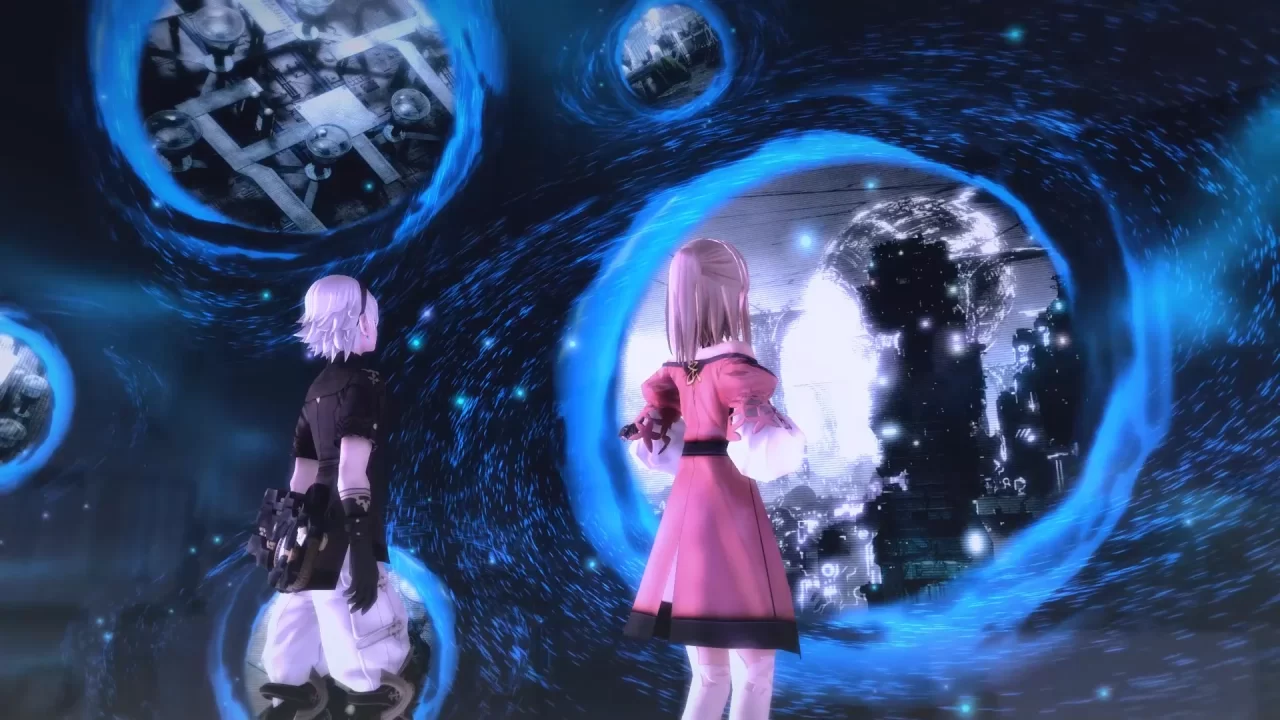
The game opens with a boy named Leo waking up in a world of machines after losing his memory, pursued moments later by mechanical assailants. After escaping with the help of a pair of friendly robots, he begins searching for clues to alleviate his amnesia. He finds help in the form of Kina, a fortune teller’s apprentice, and Cheryl, a princess he’d previously stood up on a date. As the three gradually uncover more clues about Leo’s history and goals, they’re brought into conflict with a malevolent deity known as Vam and a strange mechanical plague he has inflicted upon the world.
Fantasian’s plot is simple, which invokes a nostalgic feeling for similarly straightforward older RPGs. Given that Final Fantasy creator Hironobu Sakaguchi serves as the game’s producer, this is only appropriate. But that simplicity, combined with a lack of direction, makes it difficult to describe its story so that it sounds novel or interesting. Leo and company spend the first ten hours of the game wandering around looking for ways to jog his memory, only stumbling into the broader plot by happenstance. Once the reveals start dropping, it feels like there are still important questions left hanging, and the answers the game provides aren’t substantial enough. It’s suggested that Leo’s pre-amnesia personality was markedly different from the one he has during the story, but nothing much comes of this. It’s not often that a non-silent main character ends up being the least interesting member of an RPG party, but Leo fits that description.
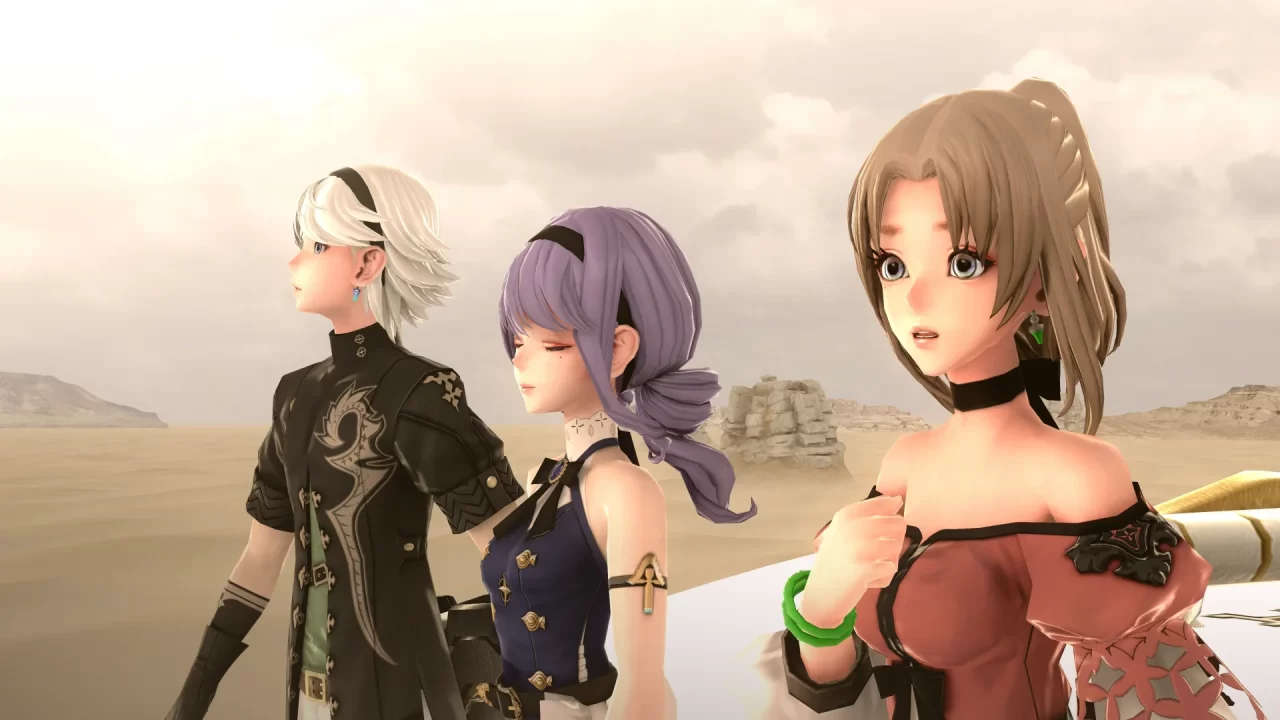

The game’s much more open second section (which makes up the majority of the playthrough) compounds many of these issues. The story’s structure is much looser here, as the player can pursue main story objectives in their preferred order. It’s difficult to justify this structure in its current form with the detrimental effect it has on the party as a narrative unit. Most characters join the party based on the player’s chosen objective, meaning that there’s no set order to ensure a given character’s presence at plot events. As such, there’s little opportunity for them to interact. Even the few members of the party guaranteed to be present at all times are bizarrely underutilized. One particularly jarring example of this is a last-minute romance that’s treated completely seriously despite the characters involved barely speaking to one another across the entire game.
The freedom offered to the player does little to offset this since main quests have concrete recommended levels anyway. A more linear experience would probably have served the story much better with no expense to the gameplay. Thankfully, a few characters have an acceptable amount of depth to latch onto, and each of them at least has some form of a character arc. Some of them work better than others, but that any of them work is good enough for me. It helps that the vocal work is solid all around, even if it isn’t transcendently good.
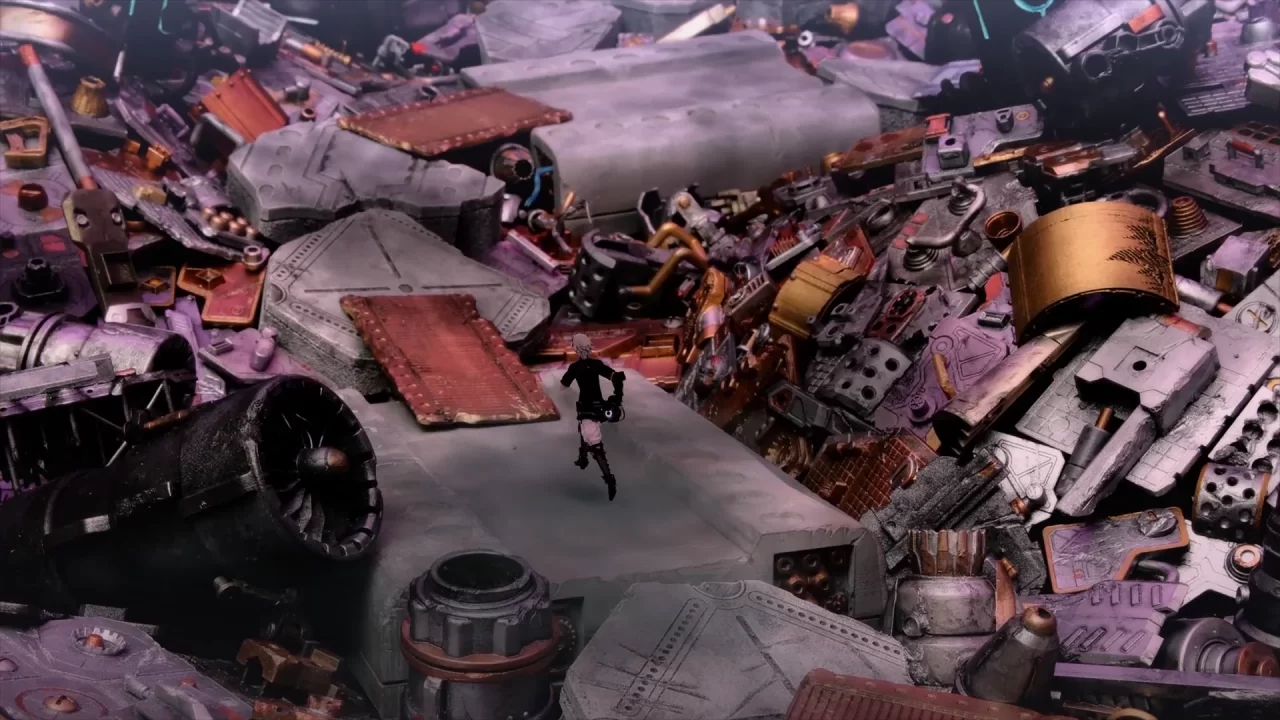

On a more positive note, a great deal of effort has gone into visually crafting the world of Fantasian, and it’s paid off. Each environment’s design consists of photographed dioramas that were physically built by the designers. There’s a texture to the locales that feels stunningly real, even if the character models don’t always look like they fit. The UI could also do more to hide its roots as an Apple Arcade exclusive game, but they’re serviceable and unobtrusive. A score by industry legend Nobuo Uematsu compliments the atmosphere, and while it’s nowhere near my favorite of his works, it absolutely suits the tone that this game aims for. If the battle music ends up feeling grating, Neo Dimension at least adds the option to select from multiple Final Fantasy battle tracks on the fly.
The amount of effort that went into making this style work is worth all the praise in the world, but its implementation isn’t perfect. For instance, the need to shift between specific camera angles depending on the player’s position within an area means the player has to come to a complete stop in order for the control stick to adjust its directional input to the new camera angle. Shifting without stopping after the transition results in the player moving according to the direction of a camera angle they’re no longer seeing. This never stops being annoying and almost makes me wish the game straight-up implemented tank controls instead.
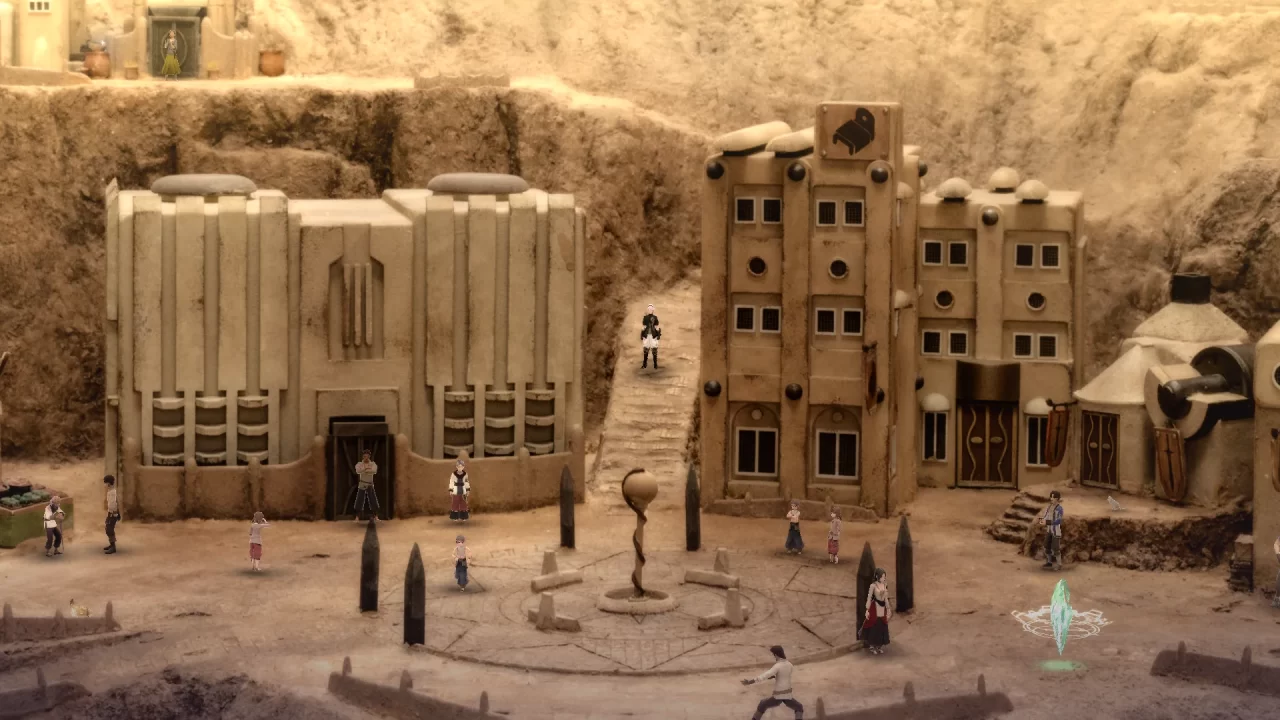

Thankfully, the game’s strengths in exploration and questing are enough to offset other annoyances. Fantasian: Neo Dimension is quite good at highlighting where to find sidequests and even has a feature providing hints for finding rare loot without making the process an effortless chore. While the sidequests have about as much going for them narratively as the main plot, they still offer worthwhile equipment and boss fights if you put the time in. And make no mistake, you want to be seeking out both of those things as much as you can because combat ends up as the saving grace of Fantasian.
Combat is uncomplicated. The most unique feature is the ability to curve certain moves to line up multi-hit attacks, but there are some inspired mechanics surrounding it. Early on, the players learn the function of the Dimengeon Machine, a device allowing them to stow away a limited amount of previously fought enemies to fight later. Using this system wisely allows for speedy dungeon traversal, expedited grinding, and much more frantic scuffles with regular enemies than in a typical RPG with random encounters. Even in this re-release, the Dimengeon Machine still feels remarkably fresh.
On the other end of combat, the game’s latter half is home to a cavalcade of great bosses. While the difficulty spikes in this section are incredibly jarring, even on Neo Dimension’s new lower difficulty option, there are always paths toward progress and victory. They’re not always obvious, and some bosses are ridiculously aggravating, but a game with a bit too much challenge is preferable in my eyes to a game that’s too easy. Victory feels like a result of good planning and understanding of each encounter. Rarely is any given fight just a standard exchange of the player’s strongest attack skills followed by a round of healing. Bosses have unique gimmicks or patterns that demand the player seriously consider their options. Each character’s skill list is refreshingly lean, and the ability to reallocate skill points at leisure makes tuning your party for each unique encounter a breeze. And since party members can swap in and out of combat instantly, those options aren’t limited by a three-person party cap.
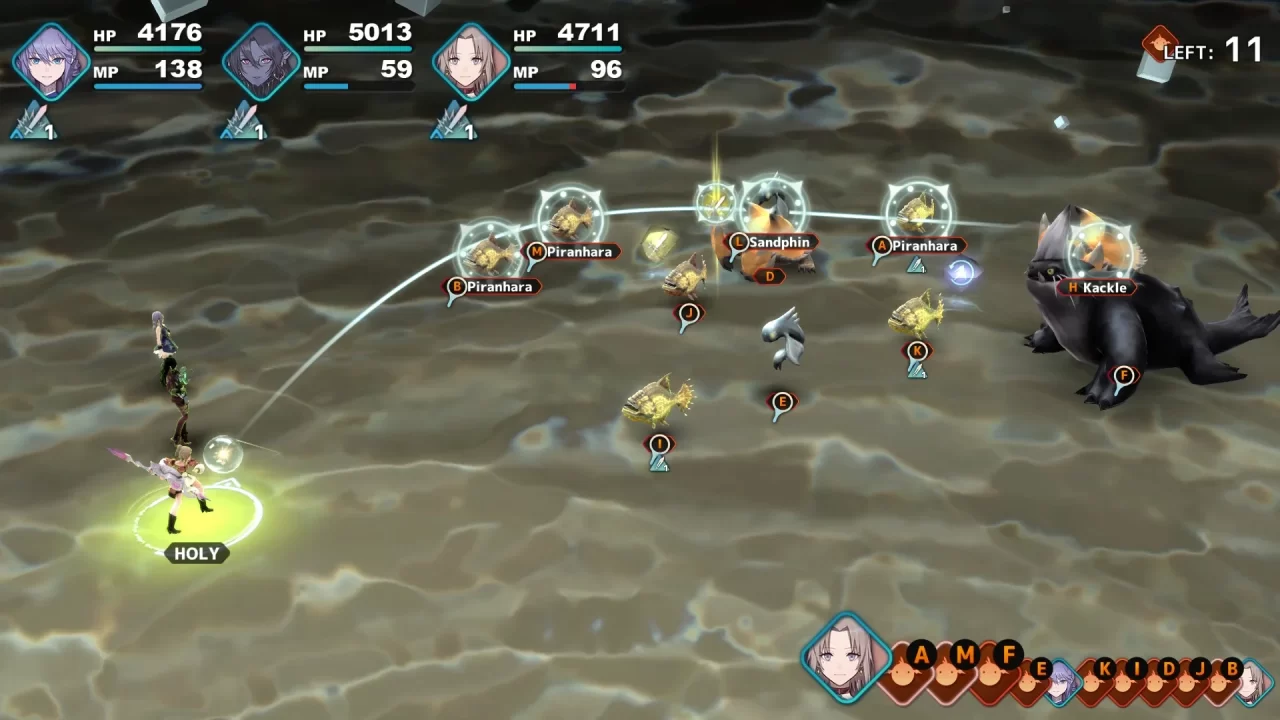

Fantasian is commendable in how it can make gameplay this conventional this engaging. I’ve played so many RPGs that feel like they’re on autopilot that seeing one requiring this much involvement was a genuine delight. I wish more games in this genre had bosses this good and mechanics so compelling. Granted, many of those games also feature better stories around the fighting, so I suppose it ultimately evens out.
Whether or not you choose to invest time in Fantasian: Neo Dimension comes down to your priorities. Are you willing to sit or speed through a bland story to get to the meaty gameplay? Or is a more gripping narrative necessary to get you through a game that clocks in at a few dozen hours? It’s hard for me to say what I personally find more important, but I ultimately came out of Fantasian glad that I’d played it. And if I had to guess, I think that its flaws are forgivable enough to be worth it for most others.













